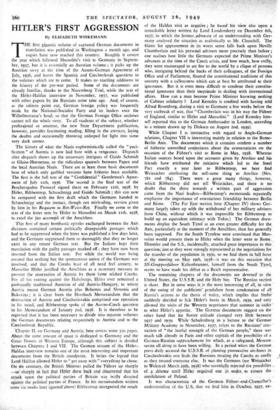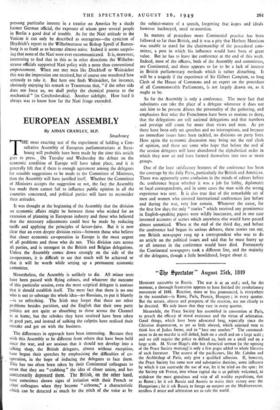HITLER'S FIRST AGGRESSION
By ELIZABETH WISKEMANN
THE first gigantic volume of captured German documents in translation was published in Washington a month ago, and copies have now reached this country. Roughly it covers the year which followed Mussolini's visit to Germany in Septem- ber, 1937, but it is essentially an Austrian volume ; it picks up the Austrian story at the time of the Austro-German Agreement of July, 1936, and leaves the Spanish and Czechoslovak questions to the volumes which arc to come. It makes no startling additions to the history of the pre-war period. Some of the documents are already familiar, thanks to the Nuremberg Trial, while the text of the Hitler-Halifax interview in November, 1937, was published with other papers by the Russians some time ago. And, of course, as the editors point out, German foreign policy was frequently made by the National-Socialist Party and its leaders over the Wilhelmstrasse's head, so that the German Foreign Office archives cannot tell the whole story. To all students of the subject, whether professional or amateur, the new State Department publication, however, provides fascinating reading, filling in the-crevices, laying the doubts and occasionally throwing unhoped for light into some very dark corner.
The history of what the Nazis euphemistically called the " paci- fication" of Austria is now laid bare with a vengeance. Dispatch after dispatch shows up the unsavoury intrigues of Guido Schmidt or Glaise-Horstenau, or the ridiculous quarrels between Papen and the local Austrian Nazis. There arc at least three basic documents here of which only garbled versions have hitherto been available. The first is the full text of the "Confidential " Gentlemen's Agree- ment of July nth, 1936. The second is the final text of the Berchtesgaden Protocol signed there on February 12th, 1938, by Hitler, Ribbentrop, Schuschnigg and Guido Schmidt ; this can now be compared with the first draft which the Germans handed to Schuschnigg and the inexact, though not misleading, version given by him in his Requiem in Rot-Weiss-Rot. Finally we come to the text of the letter sent by Hitler to Mussolini on March 11th, 1938, to extol the fait accompli of the Anschluss.
. This first of many bombastic epistles exchanged between the Axis, dictators contained certain politically disreputable passages which had to be suppressed when the letter was published a few days later, and the Germans suppressed them so thoroughly that they no longer exist in any extant German text. But the Italians kept their. translation with the guilty passages marked off ; they have now been inserted from the Italian text. For while the, world was being. assured that nothing but the spontaneous union of the Germans was involved, and that the Czechs least of all need feel anxiety, to Mussolini Hitler justified the Anschluss as a necessary measure to prevent the annexation of Austria by thoie 'same wicked Czechs. For all his ranting against the Habsburgi, Hitler ever remained a. prOfoUndly traditional Austrian of old Austria-Hungary, to whom Austria meant German Austria plus Bohemia and Slovenia and Bukovina ; it is clear from the Hossbach Memorandum that the destruction of Austria and Czechoslovakia comprised one operation in his mind, and Ribbentrop spoke of the Austro-Czech question in his Memorandum of January 2nd, 1938. It is therefore to be regretted that it has been necessary to divide into separate volumes the German documents relating respectively to Austria and to .the
Czechoslovak Republic. •
'Chapter II, on Germany and Austria, here covers some 350 pages. About. the same amount of space is dedicated to Germany and the Great Powers of Western Europe, although this.subject is divided between Chapters I and VII. The German minute of the Hitkr, Halifax interview remains one of the most interesting and important documents from the British standpoint. It belies the legend that Lord Halifax allowed 'Hitler to " get away with " everything he chose. Ori the contrary, the British Minister pulled the 'Fiihrer up sharply --se sharply in fact that Hitler drew back and discovered that his attaas upon the political parties of Britain was really directed against the political parties of France. In his memorandum written some six weeks later ,(quoted-above) Ribbentrop interpreted, the result of the Halifax visit as negative ; he based his view also upon a remarkable letter written by Lord Londonderry on December 6th, 1937, in which the formeriadvocate of an understanding with Ger- many analysed the situation as realistically as Mr. Churchill. The blame for appeasement in its worst sense falls back upon Neville Chamberlain and his personal advisers more precisely than before ; one realises how little the Germans expected tht Prime Minister's advances at the time of the Czech crisis, and how much, how evilly, they were encouraged to set fire to the world by a clique of persons who, intriguing behind the backs of their colleagues, of the Foreign Office and of Parliament, flouted the constitutional traditions of this country with a callousness which can at best be attributed to their ignorance. But it is even more difficult to condone their constitu- tional ignorance than their ineptitude in dealing with international affairs. How can a man become Prime Minister knowing nothing of Cabinet solidarity ? Lord Kemsley is credited with having told Alfred Rosenberg, during a visit to Germany a few weeks before the very outbreak of war, that "Chamberlain was in his way the Fiihrer of England, similar to Hitler and Mussolini." (Lord Kemsley him- self reported this to the German Ambassador in London, according to a minute drawn up by Dirksen on August ind, 1939).
While Chapter 1 is instructive with regard to Anglo-German relations, Chapter VII is interesting mainly in relation to the Rome- Berlin Axis. 'The documents which it contains confirm a number of hitherto unverified conjectures about the conversations on the occasion of the Fiihrer's visit to Rome in May, 1938. Whereas Italian sources based upon the accounts given by Attolico and his friends have attributed the initiative which led to the Steel Pact exactly a year later to Ribbentrop, we here find Weizsacker attributing the self-same thing to Attolico (Nos. 781 and 784). There were a great many things, however, which Ribbentrop did not tell Weizsacker, and there is no doubt that the drive towards a written pact of aggression. came from the Nazi leaders—Ribbentrop's memoranda repeatedly emphasise the importance of ostentatious friendship between Berlin and Riime. (The Far East section here (Chapter. IV) shows Ger- many largely taken up with the withdrawal of her military. advisers. from China, without which it was impossible for Ribbentrop to build up an equivalent intimacy with Tokio.) The German docu- ments display the South Tyrol as an even greater difficulty for the. Axis, particularly at the moment of the Anschluss, than has generally been supposed. For the .South Tyrolese were convinced that Mus- solini would present them to Hitler when the latter went to Rome.
Himmler and the incidentally, attached great importance to this . question; just as they were strongly represented at the negotiationi for the transfer of the pepulatiOn in. 1930, so we find thein in full force at the meeting on May 19th, 1938—it was on this occasion that SS'-aruppenfiihrer iCaltenbrunner, himself from the South Tyrol, seems to have made his debut as a Reich representative.
The remaining chapters of the documents are devoted' to the United States, the U.S.S.R:and tHe'Holy See. The Russian section is short. But in some ways it is the most interesting of all, in view ' of the swing of the publicists' pendulum from Condonation of all Russia's actions .to the thesis of today, which implies that Stalin suddenly decided to lick Hitler's boots in March, 1939, and only allowed the visits of the Western negotiators that' sunimer in order' to whet Hitler's appetite. " The German documents suggest on the ' other hand' that the Soviet attitude changed very little 'between x937 and 1939. While 'Schulenburg in 'a lecture to the' German Military Academy in November, 1937, refers to the Russians' chit- • viction of " the fearful strength of. the German people," there was much talk already in Paris and other capitals of th.e possibility of a German-Russian rapprochement for which, as a safeguard, Moscow.. seems all along to have been willing. In a period when the German press daily accused the U.S.S.R. of planting provocative air-bases in . Czechoslovakia one finds.thc Russians treating the Czechs as coolly as they treated everyone else. It was the Germans (see Wcizaadter to Welczeck March 29th, 1938) who scornfully rejected the possibility of. a, détente until Hitkr required one .in .ortkr, to ensure tlxc annihilation of Poland.' . • • - • It was characteristic of the German Fithrer-and-Chancritor'3.. understanding of the IJ.S., that we find, him ion October, x937, ex-
pressing particular interest in a treatise on America by a shady former German official, the exposure of whom gave several people in Berlin a good deal of trouble. As for the Nazi attitude to the Vatican it can only be described as outrageous—the cynicism of Heydrich's report to the Wilhelmstrasse on Bishop Sproll of Rotten- burg is so frank as to become almose naive; Indeed it seems surpris- ing that none of the Nazi were ever excommunicated. It is, moreover, interesting to find that in this as in other directions the Wilhelm- strasse officials supported Nazi policy with a more than conventional empressement. When one met men like Dieckhoff or Weizsacker this was the impression one received, but of course one wondered how seriously to take it. But here one finds Weizsacker, for instance, obviously enjoying his remark to Trautmann that, " if the other side does not force us, we shall prefer the chemical process to the mechanical " (in Czechoslovakia). Xnother sidelight. How hard it always was to know how far the Nazi fringe extended.































 Previous page
Previous page